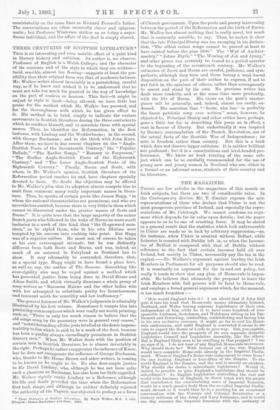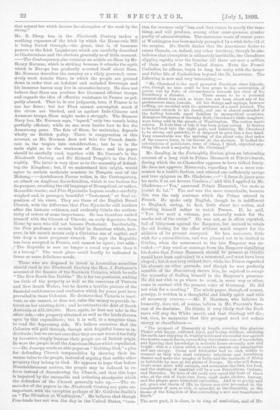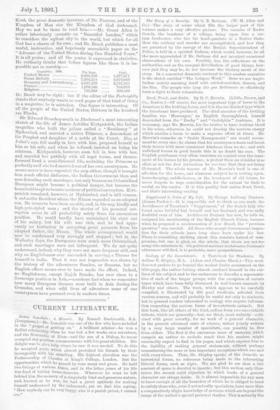THE MAGAZINES.
THERE are few articles in the magazines of this month on Irish subjects, but there are two of considerable value. In the Contemporary Review, Mr. T. Sinclair exposes the mis- representations of those who declare that Ulster is not the most prosperous province of Ireland, and especially the repre- sentations of Mr. Colclough, We cannot condense an. argu- ment which depends for its value upon details ; but the paper appears to us to be one of crushing force. It may be stated as a general result that the statistics which look unfavourable to Ulster are made so to look by arbitrary suppression,—as, for instance, when Ulster is counted without Belfast, while Leinster is counted with Dublin left in, or when the Income- tax of Belfast is compared with that of Dublin without reference to the fact that certain incomes held all over Ireland, but mainly in Ulster, necessarily pay the tax in the eapital.—Dr. Wallace's argument against leaving the Irish Members in Parliament for all purposes should also be read. It is nominally an argument for the in-and-out policy, but really it tends to show that any plan of Home-rule is impos- sible. He believes that ultimately the proposal to leave the Irish Members with full powers will be fatal to Home-rule, and employs a broad general argument which, for the moment, is too much forgotten :— "How would England take it P I am afraid that if John Bull gets it into his head that Home-rule means ultimately Ireland, Scotland, and Wales having separate legislatures of their own, independent of him, while he is to have some hundreds of irre- sponsible Irishmen, Scotchmen, and Welshmen sitting in his Par- liament and thwarting, controlling, contradicting and taxing him in his own exclusive concerns, it might go far to cool his Home- rule enthusiasm, and until England is converted it seems to me vain to expect the House of Lords to give way. But, you explain, England would have the prospects of its own separate domestic Legislative Council and Legislative Assembly, like the others. But is England likely soon to be revelling in that prospect ? I see no sign of it. I do not hear of any English Home-rule movement. Why should there he P With Ireland out of the way, England would have complete Home-rule already in the Imperial Parlia- ment. Where is England's Home-rule inducement to come from P On any footing, England is four-fifths of the Empire. To the world England is the Empire, and the rest is merely an etcetera. Why should she desire a subordinate legislature P Would it, indeed, be possible to give England a legislature that should be subordinate P An English Legislature controlling the vast and world-wide business of England, in direct touch with the people that contributed the overwhelming mass of Imperial Taxation, would be a much greater body than the so-called Imperial Parlia- ment, shrunk as it would then be to a meeting for an occasional conversation with the Foreign and Colonial Secretaries or a cursory criticism of the Army and Navy Estimates, and it would one day reannex the Imperial functions with the certainty of
that natural law which decrees the absorption of the weak by the strong."
Mr. E. Dicey, too, in the Nineteenth, Century makes a scathing exposure of the trick by which the Home-rule Bill is being forced through,—the grant, that is, of immense powers to the Irish Legislature which are carefully described to Gladstonians and the electors generally as of little moment. —The Contemporary also contains an article on Siam by Mr. Henry Norman, which is striking because it attacks the myth which in Europe has gradually accreted itself about Siam. Mr. Norman describes the country as a vilely governed, exces- sively weak Asiatic State, in which the people are ground down in order that an indolent and secluded Sovereign and his immense harem may live in excessive luxury. He does not believe that Siam can produce five thousand efficient troops, and regards the idea of effective resistance to France as pal- pably absurd. That is, in our judgment, true, if France is to use her force ; but her Fleet cannot accomplish much if the rivers are blocked, and as against Indo-Chinese and Anamese troops, Siam might make a struggle. The Siamese Navy has, Mr. Norman says, "lapsed," only two vessels being partially efficient, while no one even knows how to fire the Armstrong guns. The fate of Siam, he maintains, depends wholly on British policy. There is exaggeration in this account, as Mr. Norman does not take the French death- rate in the tropics into consideration ; but he is in the main right as to the weakness of Siam ; and his paper should be carefully read, together with Mr. Curzon's in the Nineteenth Century, and Sir Richard Temple's in the Fort- nightly. The latter is very clear as to the necessity of defend- ing the Kingdom ; but, if we understand him aright, would agree to certain moderate cessions to Tonquin east of the Mekong.—Archdeacon Farrar writes, in the Contemporary, an attack on Anglican Sacerclotalism, which is too furious for its purpose, recalling the old language of Evangelical, or rather, Recordite tracts ; and Pere Hyacinthe Loyson sends a carefully weighed and, in passages, beautiful "Testament," or final ex- position of his views. They are those of the English Broad Church, with the difference that Pere Hyacinthe still hankers after the historic evidence, and evidently thinks the authen- ticity of orders of some importance. He has therefore united himself with the Church of Utrecht, an early departure from Rome by men who did not become Protestant. Incidentally, the Pere professes a certain belief in Socialism which, how- ever, in his mouth means only a Christian use of capital, and lets drop a most pregnant remark. He says the Republic has been accepted in France, and cannot be upset; but adds : The Republic is now no longer a creed any more than it is a heresy." The weak place could hardly be indicated in fewer or more felicitous words.
Those who are disposed to inveif in Australian securities should read in the Nineteenth Century the Hon. J. Fortesoue's account of the finance of the Southern Colonies, which be calls "The New South Sea Bubble." He is far too pessimist, making too little of the property as well as the resources of Victoria and New South Wales ; but he draws a terrible picture of the financial recklessness and confusion which for years past have prevailed in those Colonies. He declares that Victoria is insol- vent, as she cannot, or does not, raise the money to provide in- terest on her existing debt ; and he estimates the debt of South Australia at 251,000,000. Here, again, he does not take in the other side,—the property obtained as well as the lands thrown open by this expenditure; but it is well, in a sanguine time, to read the depressing side. We believe ourselves that the Colonies will pull through, though with frightful losses to in- dividuals; but we are not sure that they are not trusted too fully by investors, simply because their people are of British origin. So were the people in all the American States which repudiated. —Dr. Jessopp sends an able paper on "Robbing God," a plea for defending Church temporalities by showing their im- mense value to the people, instead of arguing that unlike other property they belong to God. He appears to hope that before Disestablishment arrives, the people may be induced to re- form instead of disendowing the Church, and that this hope is impaired by the untenable and irritating standpoint which the defenders of the Church generally take up.—The re- mainder of the papers in the Nineteenth Century are quite un- important, with the exception perhaps of Mr. Gold win Smith's on "The Situation at Washington." He believes that though Free-trade has not won the day in the United States, " taxa- tion for revenue only" has, and that comes to nearly the same thing, and will produce, among other consequences, greater purity of administration. The enormous waste of recent years at Washington has been mainly prompted by a wish to be rid of the surplus. Mr. Smith denies that the Americans desire to annex Canada, or, indeed, any other territory, though he also believes that absorption is ultimately inevitable, the Canadians slipping rapidly over the frontier till there are now a million of them settled in the United States. Even the French Catholics, he affirms, begin to long for unity with the larger and fuller life of Catholicism beyond the St. Lawrence. The following is new and very interesting :— "Mr. Cleveland is the most powerful President since Lincoln, who, though no man could be less prone to the assumption of power, was by forte of circumstances towards the close of his
Presidency a dictator There seems to be a personal interest about him such as there has not been about any of his predecessors since Lincoln. All his tloings and sayings, however trifling, are recorded, with the minuteness of a court journal. The sentiment extends to his family, and one is almost reminded of the feeling towards royal families in monarchical countries. Miniature likenesses of the baby Ruth, Cleveland's little daughter, were being sold in the streets of Washington. The nation wants reform. It feols that of late it has been going astray. It desires to be led back into the right path, and believing Mr. Cleveland to be strong and patriotic, it is disposed to give him a free hand. Very remarkable was the uprising of the silent vote, that index of the reserve force, in his favour at the election. It baffled the calculations of politicians, none of whom, I think, expected any- thing like such a majority for Mr. Cleveland."
Mr. Smalley, in the Fortnightly Review, gives an interesting account of a long visit to Prince Bismarck at Friedrichsruh, during which the ex-Chancellor appears to have teilked freely.
He does not approve Home-rule, regarding it as a mere con- cession to a hostile faction, and uttered one sufficiently savage and true epigram on Mr. Gladstone :—" force de jouer avec lea mots, il en eat devenu Pesclave ;2 end this I applied to Mr. Gladstone.—' Yes,' answered Prince Bismarck, 'lea mots se jouent de lui.' " The mot was the more remarkable, because this was the only sentence which the Prince uttered in French. He spoke only English, though he is indifferent to England, caring, in fact, little about her action, and devoting himself rather to watch France. If, he said, "'You live next a volcano, you naturally watch for the smoke out of the crater." He was not, as is often reported, full of bitterness against the Emperor, but seemed to retain the old feeling for the office without much respect for the abilities of its present occupant. He has, moreover, little wish for a reconciliation, and was pleased not to be invited to Gorlitz, when the monument to the late Emperor was un- veiled :—" Any word or message from the Emperor signifying his desire that Prince Bismarck should be present at Gorlitz would have been equivalent to a command, and must have been obeyed; but it was very evident that, while the Prince regretted his absence on other grounds, and though he was perfectly sensible of the discourtesy shown him, he rejoiced to escape the necessity of finding himself in the Emperor's presence. He did not wish to go where he must, in some way or other, come in contact with the present ruler of Germany. He did not wish for a meeting." The whole paper, though, of course, gossipy, is written in a thoughtful and kindly spirit and with all necessary reserve.—Mr. F. Harrison, who believes in humanity, does not, of course, believe in Mr. Pearson's fore- cast of its destinies. He thinks it very likely that the Dark races will stay the White march, and that theology will die ; but, then, he maintains that this prospect need not reduce energy or cheerfulness :— "The prospect of Humanity at length covering this glorious Planet with happy, cultured, loyal, and loving children, subduing the earth and enjoying it, waging noble and successful war against the hostile cosmic forces, ransacking the infinite seas of knowledge, and figuring that knowledge in costhetic forms eternally new and bright—this is a vision which is equal to sustain any imagination and any energy. Omar and Alexander had no such worlds to conquer as they who shall extirpate infectious and hereditary disease and make the jungles of India and the lowlands of Africa as habitable by man as the plains of Europe. He who will domes- ticate some more wild animals, and economise the fuel, the food, and the clothing of mankind will be a now Prometheus, Cadmus, and Hercules. No hero of old could ever equal the feats of those who, at the risk of their own lives, shall make cholera, leprosy, and the plague mere historical curiosities. And as to poetry and art, grace and charm of life, no theme was over presented to the imagination of man so rich, so splendid, so inexhaustible, as the theme of the Kingdom of Man controlling a new and transformed Earth."
The next poet, it is clear, is to sing of sanitation, and of Mr. Kent, the great domestic inventor, of Dr. Pasteur, and of the Kingdom of Man vice the Kingdom of God dethroned. May we not be there to read him.--Mr. Grant Allen is rather laboriously zarcastic on "Beautiful London," which he considers the ugliest city in the world, but which for all that has a charm of its own ; and Dr. Brock publishes a most useful, instructive, and hopelessly unreadable paper on the " Advance of the United States during One Hundred Years." It is all praise; and all the praise is expressed in statistics. He evidently thinks that before figures like these it is im- possible not to worship :—
Countries. 1890.
United States Great Britain Germany and Luxembourg France Belgium Pig Iron.
9,202,703 7,904,214 4,637,239 1,970,160 781,958 4,277,071 3,679,043 2,161,821 704,013 239,266
Dr. Brock may be right ; but if the editor of the Fortnightly thinks that anybody wants to read pages of that kind of thing in a magazine, he is mistaken. One figure is interesting. Of all the people of the United States, thirteen in the hundred are Blacks.
Sir Edward Strachey sends to Blackwood a most interesting sketch of the life of James Achilles Kirkpatrick, the Indian magnifico who built the palace called a " Residency " at Hyderabad, and married a native Princess, a descendant of the Prophet and daughter of a noble at the Court. She, at Juliet's age, fell madly in love with him, proposed herself to him as his wife, and when he refused, insisted on being his mistress. Kirkpatrick, however, soon fell in love with her, and married her publicly with all legal forms, and thence- forward lived a semi-Oriental life, secluding the Princess as perfectly as if she had married one of her own countrymen. He seems never to have repented the step either, though it brought him much official disfavour, the Indian Government then and now detesting such marriages, not only because an Orientalised European might become a political danger, but because the household is apt to become a centre of political corruption. Kirk- patriek remained, however, at Hyderabad, and is still remem- b red as the Resident whom the Nizam regarded as an adopted son. He seems to have been an able, and, in his way, kindly and high-principled man ; and the stories of his personal cor- ruption arose in all probability solely from his anomalous position. He could hardly have maintained his state out of his salary, but his wife was rich, and he bad appa- rently no hesitation in accepting great presents from his adopted father, the Nizam. The whole arrangement would now be condemned very strongly and stopped ; but in the Wellesley days, the Europeans were much more Orientalised, and such marriages were not infrequent. We do not quite understand, indeed, why they were not more frequent still, and why no Englishman. ever succeeded in carving a Throne for himself in India. That it was not impossible was shown by the history of the adventurer Sombre, or Sumroo, but no English officer seems ever to have made the effort. Indeed, no Englishman, except Rajah Brooke, has ever risen to a Sovereign position in Asia,—a curious fact when we remember bow many European thrones were built in Asia during the Crusades, and what wild lives of adventure some of our countrymen have pursued even in modern times.












































 Previous page
Previous page